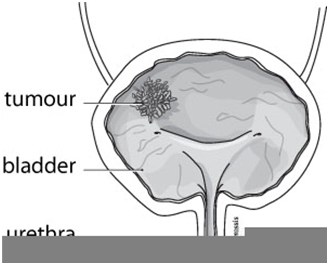
You have been found to have cancer of the bladder lining. It has been treated by cauterizing or scraping using an instrument passed through the urethra (the “urinary passage”). Even if all visible cancer has been removed, microscopic disease may remain from which new tumours can develop. Your doctor has recommended BCG treatments to eliminate possible remaining cancer cells and reduce the risk of recurrence.
Before your treatments BCG works best when kept at full strength in the bladder. To prevent dilution of BCG by urine, you should limit your fluid consumption to no more than 250ml (1 cup) in the four hours before each treatment. Diuretic medications (“water pills”) increase urine production and have the same dilution effect. They should be taken two hours after your treatment rather than before.

Your doctor or a nurse will administer your BCG treatments. A narrow tube (catheter) is advanced through the urethra into the bladder. After draining any urine, a small volume of BCG solution is put into the bladder. The catheter is then removed. You will be advised when you can go home. When difficulty is encountered during the insertion of the catheter, BCG treatment may be postponed for one week.
The introduction of BCG into the bloodstream or body tissues can cause serious illness. BCG (Bacillus Calmette Guerin) is a bacterial vaccine originally developed for the prevention of tuberculosis. When placed in direct contact with bladder cancer, it stimulates a reaction that can kill cancer cells and prevent them from coming back. Experience in many thousands of men and women has shown it to be effective at controlling bladder cancer.
Generally, we will recommend a course of BCG treatments once every week for six weeks, starting several weeks after surgery. The treatments will be administered at your hospital or clinic. Your doctor may advise additional treatments several months after your first round. Sometimes, these maintenance treatments may continue for several years.
After your treatments BCG must be kept in contact with the bladder lining for it to be effective. This may be improved by lying down on your front, back and each side for 15 minutes at a time over one hour. It is best to delay voiding for about two hours after each treatment. When it comes time to void, this should be done sitting down to avoid splashing. BCG is a live vaccine that can cause harm if it comes into contact with other parts of the body. After emptying the bladder, the BCG must be neutralized. This is done by adding household bleach to the urine in the toilet.
For the first six hours after each treatment, pour 250 ml (1 cup) of bleach into the toilet after every void. Let the bleach sit in the toilet for 15 minutes to neutralize the BCG before flushing. Your washroom should be well ventilated since the mixture of urine and bleach can sometimes give off strong fumes. Wash your hands and genitals thoroughly after each void during the first six hours after treatment. Contact with urine should be avoided for six hours after each BCG treatment. Any area of skin contact should be washed thoroughly with soap and water. Urine splashes should be wiped up with a strong disinfectant or bleach.
Sexual intercourse should be delayed for at least 24 hours after BCG treatment.
After each treatment, it is not unusual to have a headache, low-grade fever (less than 38.5°C or 101°F), poor appetite and low energy for up to three days. Acetaminophen (e.g. Tylenol™) often will help to alleviate these symptoms.
More frequent and urgent urination with mild burning is common for a few days. These effects can be treated, if necessary, with phenazopyridine (e.g. Pyridium™) available by prescription.
After your course of BCG treatment, you will need to be reassessed to see how well it worked. Urine samples may be examined for the presence of cancer cells (urine cytology) and the bladder may be inspected visually with an instrument passed through the urethra (cystoscopy).
Further BCG treatments may be recommended. In some cases, additional treatments including surgery may be required for cancer control.